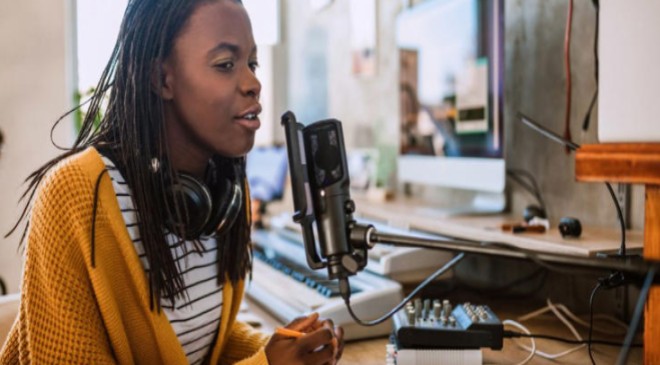A good one can be tremendously valuable to your business. Here’s how to get started
Podcasting has amplified the voice of the everyman. Instead of elevating news anchors or experienced directors as the only storytellers who can share their thoughts with the world, podcasts allow anyone to create their own projects, publish them, and cultivate an audience that connects with their content.
Podcasting is also a valuable part of marketing strategy. “Companies are allocating part of their marketing budget to partner, sponsor, roll out ads, and even be paid guests on some of these platforms that have a lot of exposure,” says Shawn Flynn, investment banker and host of the popular Silicon Valley podcast.
Podcasts help business owners identify and reach their target audience on a new level. By telling the story of your brand or company, potential customers can get to know you on a more personal level. These connections are priceless marketing assets.
Podcasts themselves can also be lucrative. There is a lot of money to be made from advertisements and sponsorships. “There are a lot of ways to make revenue and actually turn this into a career,” says Flynn. “Platforms for many podcasts are actually acquiring other platforms for many podcasts and rolling them up. And guess what? It’s residual income. It’s almost a SAS model.”
The earning potential has made podcasting the fastest-growing genre of media and entertainment. There are more than one million podcasts and over 100 million listeners, with 40% of them in the United States. The $14 billion market is poised to grow to $60 billion by 2025.
And even with this exponential growth, this new form of storytelling has only scratched the surface.
So, what’s a podcast worth? If your podcast is monetized, you can expect 4-7x on revenue, depending on your niche and audience size. It’s not all about size, though. A podcast with a specific niche and audience is worth more than an unfocused podcast on broad topics, even with a vast audience. A podcast that is not monetized is valued solely by the brand and listener base. Shows like this can expect $2-5 per monthly listener.
Here are THREE ways to maximize the value of your podcast:
1. Connect with your audience. Even though recording your podcast can be an intimate experience, your audience is out there. Get to know them. Ask for feedback. Give shoutouts to reviewers and supporters. Use social media to connect with listeners. Without your audience, your podcast will be like speaking into the void. So, engage with your listeners and show them you’re listening to them, too.
2. Find your community. Don’t focus on big-name brands or celebrity podcasters for your collaborations. Find guests who will resonate with your listeners, even if they’re not stars (yet). Those big names are inundated with requests. You might never get a response from such popular programs. And you never know which up and comers will become the next big names. They might get their first exposure on your show. It’s quality over quantity. Pay attention to the insights your guests can offer, instead of the number of their followers.
3. Leave shame at the door. You can create amazing and riveting content, but no one will see or hear it if they don’t know about it. You can’t be ashamed to talk about your work. If you don’t toot your own horn, no one else will know what you’re creating or how to find it. Tap into your community and tell everyone about your work. Reach out to other podcasts about appearing as a guest and plug your show. Post updates, behind-the-scenes clips, and successes to your social media. Send information about your show to media outlets, even Twitter accounts or newsletters. There’s no shame in shameless self-promotion.
The late, great Larry King said, “If you are honest with your audience, you can’t go wrong.” Authenticity is key. Your audience will trust you and reward you with their loyalty if you are honest and authentic. The camera and mic have a long memory. If you’re inauthentic, the record of that dishonesty will always come back to bite you.
Podcasting has revolutionized how we share stories. No more pursuing a major studio’s approval. No more competing with famous anchors or waiting for a time slot to open up. You can create your own space for the conversations you want to hear instead of listening to what networks have selected for you.
The landcape of entertainment is changing, and a new generation of creators and listeners are here to plant their ideas. What grows in this garden will bear the fruits of the future of media.
See Veristrat for additional information on how to value your business.





































